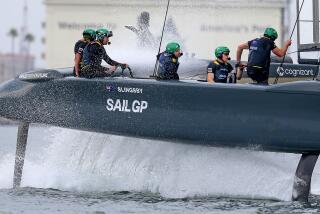Sailing for the Gold : Naval Architect Wants to Compete in the Single-Handed Race, a New Event for ’92
- Share via
BOSTON — Ingenuity, enterprise and plain old-fashioned determination are among the chief assets in Diane Burton’s campaign to make the 1992 United States Olympic sailing team.
To be fully prepared for a two-week team selection trial in Corona del Mar next April, the Annapolis, Md., resident has taken a leave of absence from her job as a naval architect with the Department of the Navy.
To fund the effort, the former University of Michigan sailing team member (1976-’79) has established a $42,700 budget for travel and equipment and pulled together a network of contributors (“The Friends of Diane Burton”).
“Many are people I’ve worked with, crewed with and competed against,” she said during a recent swing through Boston before heading to the Women’s World Championships in Long Beach.
“Whether I make it or not really doesn’t matter to these people; they just want to support someone going for it, trying to win a gold medal.”
With the help of a friend who has loaned her public-relations and managerial help, Burton knocks on doors to put out the word about her campaign in particular and women’s sailing in general.
She distributes brochures announcing “Diane Burton sets sail for the 1992 Olympics,” and although there are check-off boxes for tax-deductible contributions from $25 to $500, “$5 still gets you a newsletter.”
Her parents, loyal sailing crew members, introduced Diane to sailing in Detroit when she was still in grammar school by letting her putter around in a family dinghy.
That ignited an enduring passion for single-handed sailing, which in ’92 will join boardsailing as new Olympic women’s events.
Until 1988, when women competed in a double-handed event, won by a U.S. crew, the Olympics had no separate women’s races.
“Women could compete against the men,” Burton says, “but the chances were very slim that they would win because of the physical demands of the boats.”
The United States is at a disadvantage in the inaugural single-handed races, which will be contested in Europe dinghies. It is a boat familiar to Europeans, but not to Americans.
Since winning a spot on this year’s U.S. sailing team, Burton has devoted herself to training and gaining the critical time-in-boat experience, both in Europe and in North America.
She will continue her training in Florida this winter, then move to California to complete preparations for the Olympic trials for the sole single-handed U.S. slot.
Burton has nearly 20 years’ experience in lasers, a heavier class of boat than the 11-foot-long Europe dinghies, which she describes as “very agile and technical” as well as “tippier.”
“When I get on a laser now,” she says, “I feel like I’m on a sidewalk.”
More to Read
Go beyond the scoreboard
Get the latest on L.A.'s teams in the daily Sports Report newsletter.
You may occasionally receive promotional content from the Los Angeles Times.






